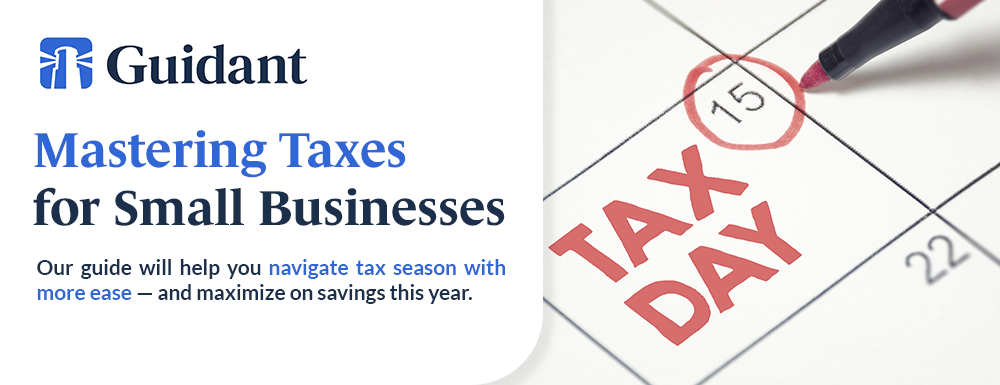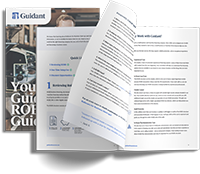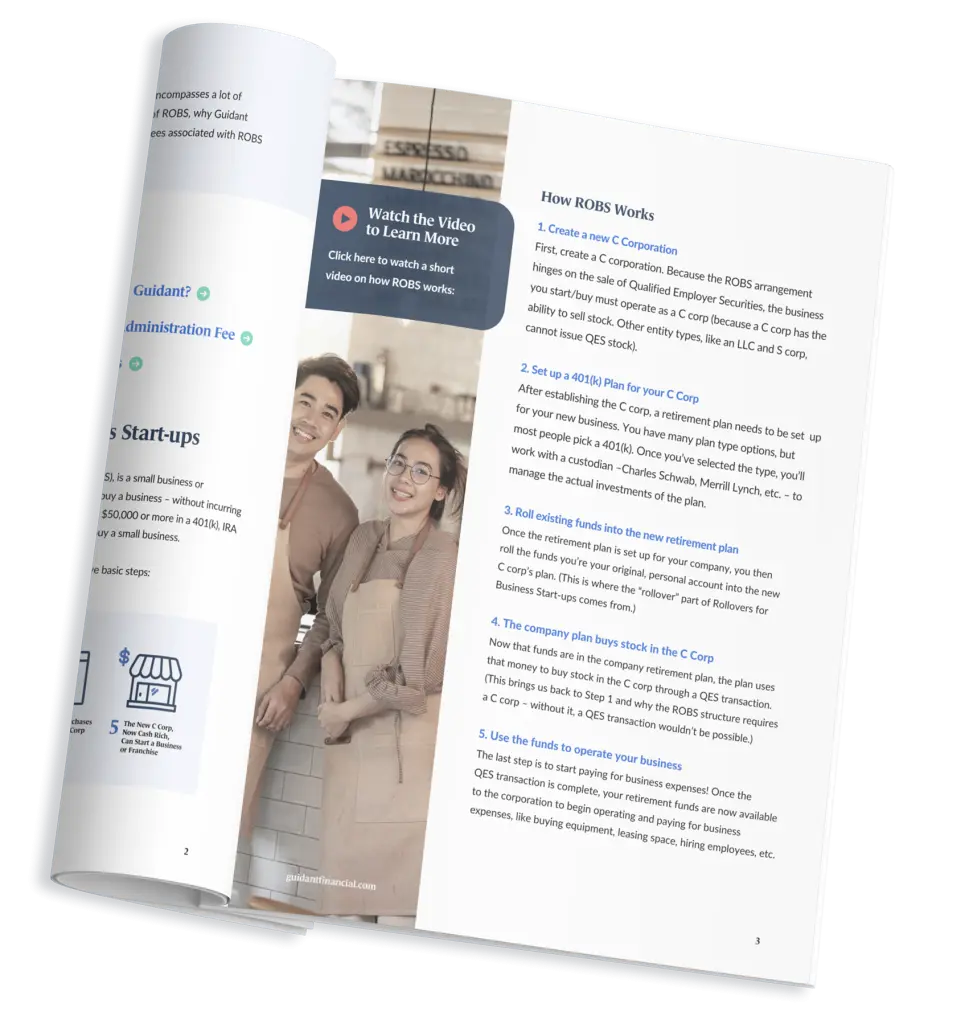As a small business owner, you’ll want to understand the unique needs of taxes for small businesses — especially as tax season approaches. Why? For starters, a lack of understanding can lead to fines and penalties for incorrect or late filings. And those fines or penalties can be steep. Without proper guidance, you also risk overlooking significant deductions and credits your small business is entitled to during tax season.
Understanding how to file taxes as a small business can help maximize your cash flow by eliminating fines and penalties and ensuring you pay only the tax you owe — and not one cent more. It can also optimize your time by ensuring you don’t have to fix a future problem that could easily have been avoided.
Below, we cover essential topics such as understanding which taxes must be paid (and when), which expenses are deductible, and the latest updates to tax laws that could impact small businesses. Our guide helps you as a small business owner stay compliant while capitalizing on potential savings, providing an effective roadmap to confident and successful tax management.
Looking for a balance sheet to manage your taxes this season? See How to Make a Balance Sheet in 5 Steps with a FREE Guidant Balance Sheet Template included.
Mastering Taxes for Small Businesses
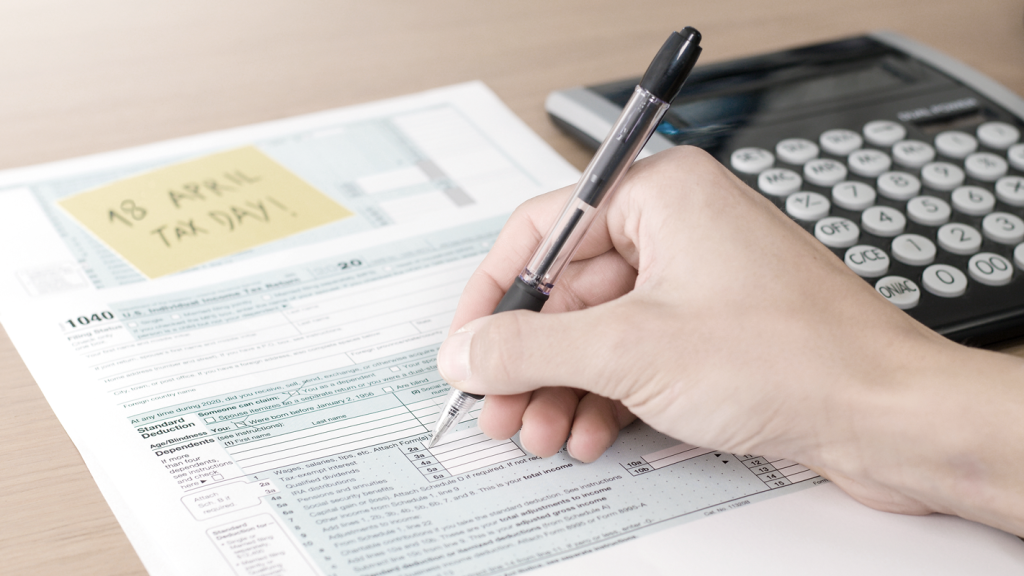
Small Business Tax Filing Deadlines
Most in the U.S. know that April 15 of every year is officially Tax Day. This is the final day for most companies to file their taxes for the last fiscal year. But for small businesses, the tax filing deadline is also more complicated than that.
First, in addition to Tax Day, businesses owe estimated quarterly taxes. This year, those tax deadline dates are April 15, June 15, September 15 and January 15. (If the date falls on a Federal holiday or weekend, the due date is the next business day.)
Second, if you hire people in your business, you owe them a Form W-2 (for salaried employees) or Form 1099 (for contractors or freelancers) by January 31 every year, for the prior year.
Third, filing dates can depend on your business entity structure. If your small business is an S Corporation, a partnership or a Limited Liability Company (LLC) taxed as a partnership, the overall filing deadline is March 15, not April 15. (The April 15 deadline applies to all other corporate structures.)
Did you know C Corps have unique tax benefits? Learn more about them in 10 Tax Benefits of C Corporations.
Taxes on Small Businesses

Businesses owe several types of taxes, making the preparation and filing of small business taxes quite different from taxes you may have had as a single employee. To accurately track and report your taxes, you’ll need to know which taxes you owe. Let’s breakdown all the different types of taxes small businesses typically owe — from income tax to federal excise tax:
Income Tax
All businesses owe business income tax. On April 15, all business structures except partnerships must file an income tax return for the prior year. (Partnerships file an information return on that date.)
Estimated Tax
The Internal Revenue Service (IRS) requires income tax to be paid as earned. To fulfill this taxable income requirement, businesses must pay estimated income tax quarterly. Many states require this as well; check with the state where you do business to determine requirements and dates.
Self-Employment Tax
Self-employment taxes must be paid annually if you are a sole proprietor. The self-employment tax is levied to fund Social Security and Medicare. Your payment ensures that you will be covered for your earnings in the Social Security system when you retire.
Payroll Taxes
If you have salaried employees, you must withhold and pay taxes in the following categories from their paychecks:
- Social Security and Medicare taxes
- Federal income tax
- Federal Unemployment Tax (FUTA)
States may also require income tax and unemployment taxes; check with your individual state to find out. Localities may also require specific taxes; check with your city, county, or other relevant authority to determine any small business tax requirements.
If you employ contractors and pay them more than $600 annually, you need to file a 1099-MISC with the IRS and issue one to them. You are not responsible for withholding contractor taxes. Each contractor uses the 1099-MISC to file their own personal tax returns.
Sales Taxes
Most states and many localities require you to pay taxes on qualifying sales. All states levy sales tax except Alaska, Delaware, Montana, New Hampshire, and Oregon. Check with your individual state and locality to find out sales tax requirements.
You may also have to comply with tax laws in each state and locality where you do business.
Federal Excise Tax
Federal excise taxes must be paid on the manufacture or sale of certain products, the operation of specific types of businesses, the use of some equipment, facilities, and products, and the payment received for certain services. For example, an excise tax is charged on particular trucks and buses used on public highways.
It’s prudent to work with an accountant or tax professional to ensure the correct forms are filed and taxes paid.
Which Business Expenses Are Tax Deductible?
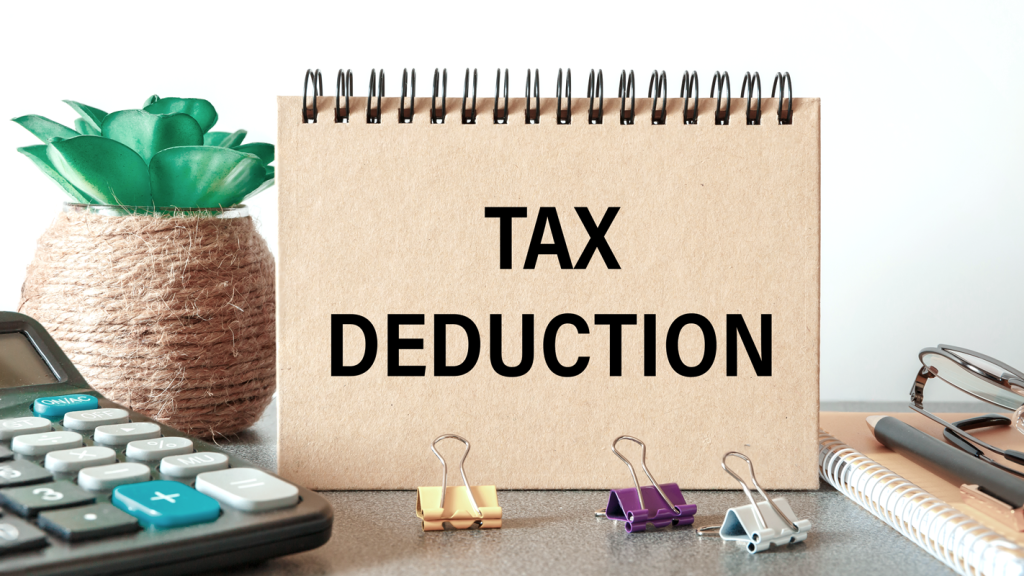
Many expenses are tax deductions for small businesses. To receive business deductions, make sure that you keep accurate records of each deductible expense. Here are some common tax write-offs for small businesses.
- Employee salaries are tax deductible.
- Some employment benefits, such as retirement contributions and education benefits, are eligible for deductions.
- Professional fees (such as professional association memberships) and costs for training are tax deductible.
- Charitable donations made by the business are tax deductible.
- Rent for an office, retail space, or warehouse is deductible.
- Home office expenses proportionate to the space used are deductible as long as the space is used exclusively.
- Business travel and entertainment: Costs for business travel, such as airplane flights, hotels, cars, and other expenses on a trip, are deductible. Expenses such as dinners used to entertain clients are also deductible.
- Business use of a vehicle: Operating costs for a personal vehicle used for business purposes are tax deductible. You will need to be able to document the extent to which you used the vehicle for business purposes (by keeping track of mileage and fuel for business trips, for example).
- Advertising: Expenses used for advertising your business, such as digital marketing, billboards, flyers, direct marketing, and so on, are all deductible.
Understand the Difference Between Tax Deductions and Tax Credits
While most small business owners are aware of tax deductions, far fewer are aware of another benefit for taxes on businesses: tax credits for which their business might be eligible. It’s important to know the difference between the two.
A tax deduction is subtracted from your income, which can lower both the amount of tax owed and the tax rate the income is subjected to.
A tax credit, on the other hand, reduces the tax you owe. If you owe $5,000 in taxes and have a tax credit of $1,000, it reduces the tax you owe by $1,000 to $4,000. Here are some examples of tax credits.
Research and development tax credit: If your business engages in qualified research that results in product development or enhancement, you may be eligible for a tax credit.
Secure Act 2.0
The Setting Every Community Up for Retirement Enhancement 2.0 Act of 2022 (SECURE 2.0) contains multiple potential credits for employers who set up and administer retirement plans, such as 401(k)s. A number of credits extend into 2024 and beyond.
Tax Law Changes for 2023
Tax laws and requirements change constantly, and last year was no exception. Here are some examples of changes in tax laws for 2023 (which apply to returns filed in 2024):
Section 45E Credit
The SECURE Act raises the Section 45E credit for employer contributions to small employer pensions, beginning in 2023, for the first five tax years. The credit is available if you have 50 employees or less and phases out if you have over 100 employees.
Interest Expense Limitation Rule
The interest expense limitation rule caps the interest expenses businesses can deduct in a year to a total of 1) business interest income for the year, 2) 30 percent of adjusted taxable income, and 3) your floor plan financing interest expense. During the COVID-19 pandemic, this rule was temporarily in abeyance. However, it is now back in effect.
Tax Words to the Wise
You should always maintain complete records of your tax documents and all relevant financial records related to tax obligations, such as deductions and credits. The IRS requires small businesses to keep tax records for three years after filing and paying the tax. In addition, you need to retain employment tax records for at least four years.
The tax universe is complicated and ever-changing. Our discussion of tax deductions, tax credits, and changes to tax laws is only a brief overview. Consult with an accountant or other tax advisor for professional advice about tax planning strategy year-round to make sure you receive the appropriate guidance for your individual situation and for help with preparing and filing your tax returns, particularly for complex tax situations!
Get ahead of your finance game with our 6-Step Guide to Financial Planning and Budgeting for the Rest of the Year.
Master Your Taxes with Guidant

Guidant’s Bookkeeping & Tax services are tailor-made for small businesses, focusing on essentials to streamline your administration and boost cash flow. Compared to costly, overblown packages, we offer exactly what you need to manage your business without being bogged down by paperwork — so you can focus on growing your dream business.
With Guidant’s Bookkeeping & Tax, you’ll gain a team of experts in financial reporting and industry benchmarking at your side, providing valuable insights to help boost your business and remove the guesswork from decision-making. Plus, regular consultations with our experienced support team — who are well-versed in QuickBooks, tax, and accounting across all major industries and in all 50 states — ensure personalized guidance.
The best part? All of our services are fully digital and streamlined, offering an effortless experience across all major platforms, including payroll, point-of-sale systems, bank accounts, 401(k) compliance, and more. Discover all the ways Guidant can help your business thrive here.
Call us today at 425-289-3200 for a free, no-pressure business consultation to get started — or pre-qualify in minutes for business financing now!

“I knew that I needed a funding partner that would be a reflection of the community we are trying to serve — and that is really where Guidant shines.”
— Daniella Cornue, Le Village Cowork
Read the stories of REAL small business owners who work with Guidant.


